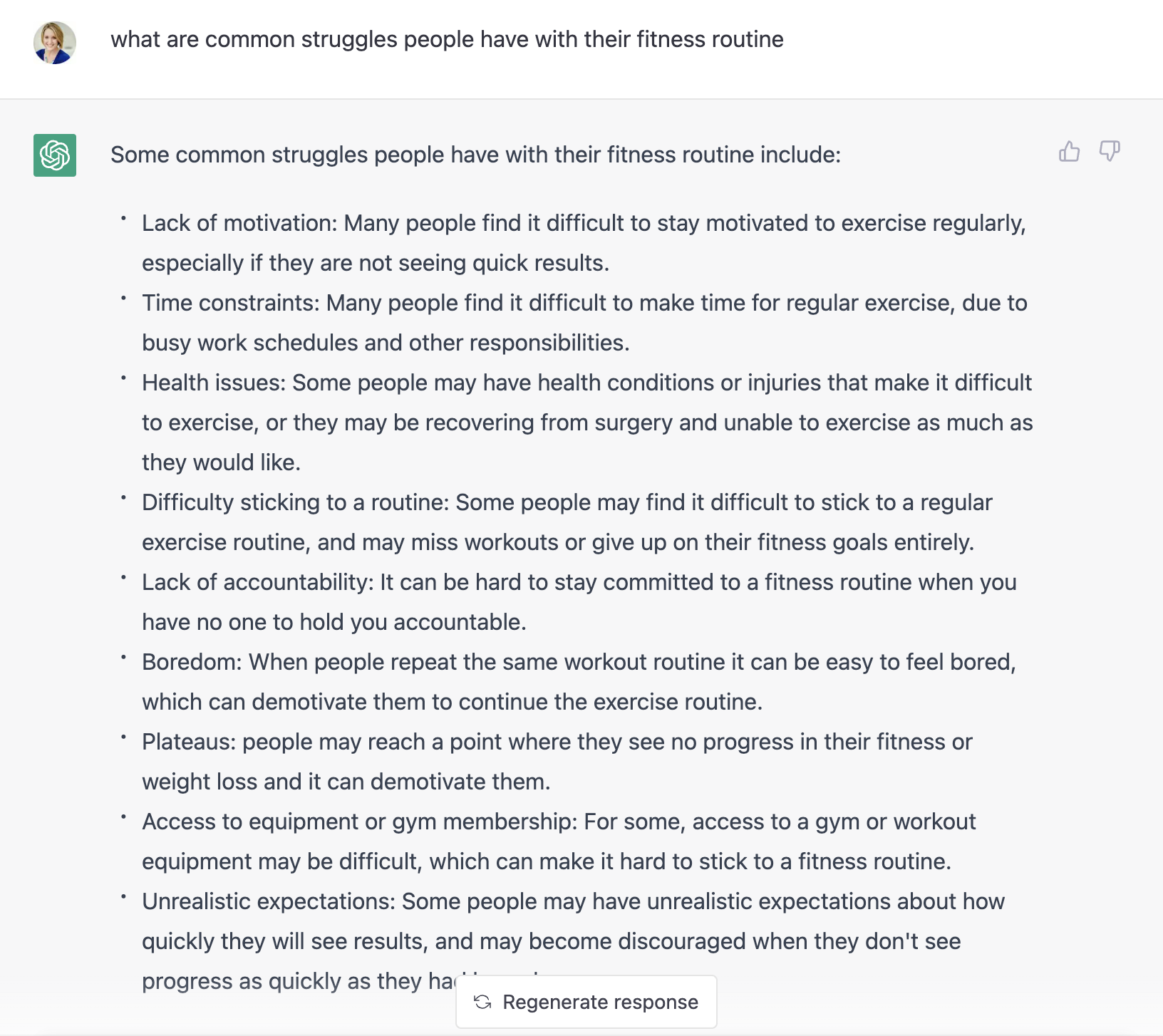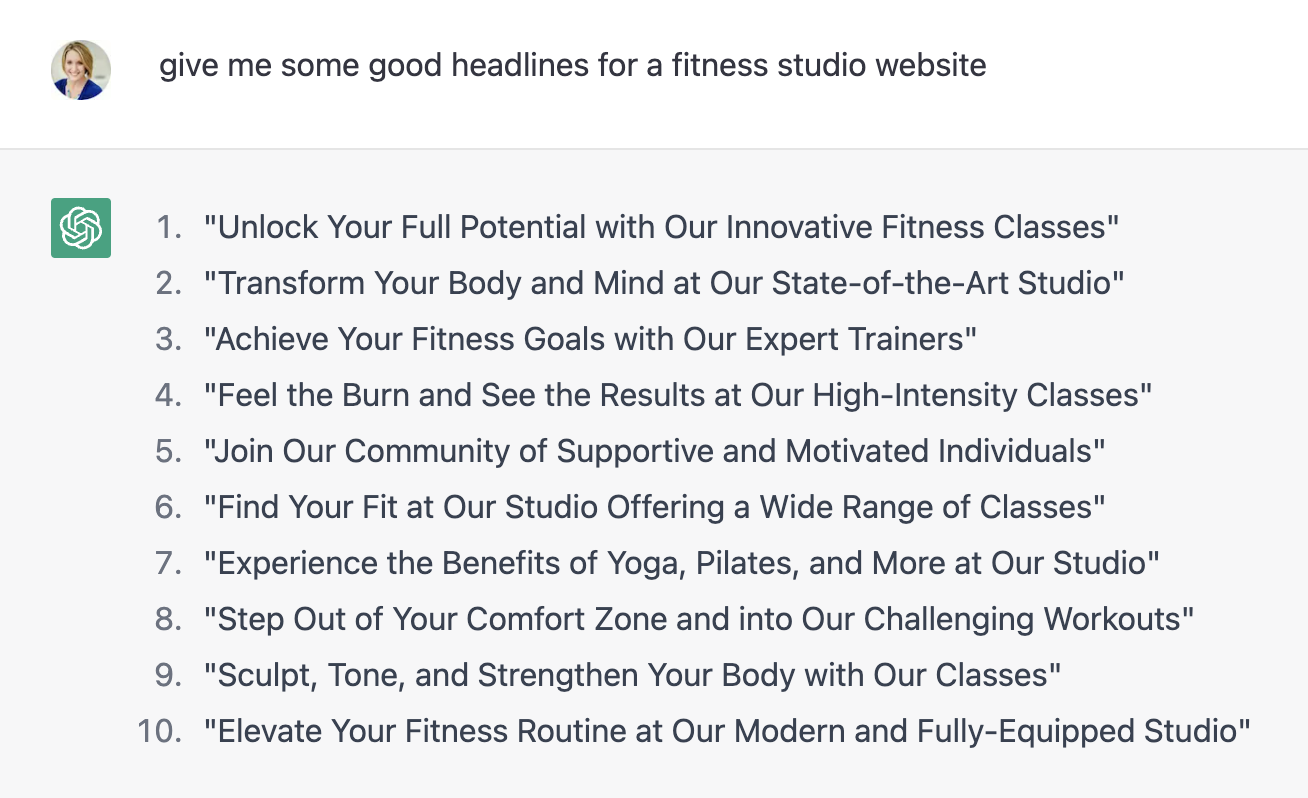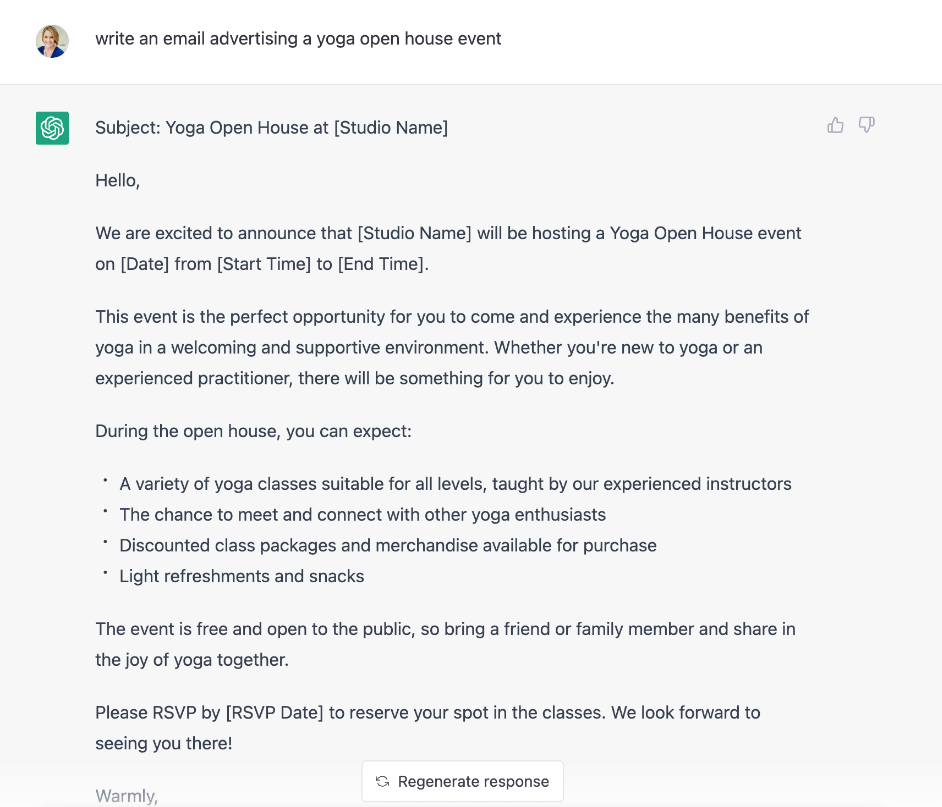Is Using ChatGPT for Website Copy a Good Idea?
Over the past few years, we’ve seen the rise of AI writing tools, and as these tools continue to evolve, more people are looking for opportunities to take advantage of them. As a website designer, this is something I’m having more inquiries from clients about, particularly about whether or not using AI for website copy is a good idea.
As someone who has spent over a decade designing websites for fitness studios, I know firsthand how important website copy is. Just like the design of your website, investing in good copywriting should be part of your bigger picture.
Sure, AI can be helpful, but it isn’t a replacement for human-generated website copy. While you may initially save some money on content creation, whether or not that content does its job is a whole different story.
When I speak to clients I could easily advise them to simply avoid using AI for website copy, but like everything else, I think it’s important to understand why this is my recommendation.
Let’s explore the ins and outs of ChatGPT and using AI for website copy.
What is ChatGPT and how does it work?
Entering the market in late 2022, ChatGPT has gotten a tremendous amount of attention. Created by AI research company OpenAI. ChatGPT is a natural language processing tool that allows users to have human-like conversations with a chatbot.
With its ability to learn what humans mean when they ask questions, this technology is expected to change the landscape of how we interact with computers.
Based on Large Language Model (LLM) technology, ChatGPT is trained using large swaths of data to accurately predict what comes next in a sentence or conversation. Think of it kind of like the autocomplete feature on your phone. It sees what you are saying and then fills in the rest, pulling from the 175 billion parameters built in.
Like any other machine-based technology, the quality of the output will be heavily dependent on the quality of the input. It’s also trained to give answers based on what it predicts the human will want, which can result in inaccurate answers.
ChatGPT currently has a free version and a paid version. OpenAI has indicated no plans to remove access to the free version, as it encourages people to use the tool and allows for OpenAI to continue collecting valuable data to improve the quality of the intelligence.
That all sounds great, right? But there are downsides…
Google isn’t a big fan of AI content
When it comes to writing of any kind — especially something like website copy — it can be tempting to take a shortcut. But it’s important to remember that writing, like most things, is a specific skill set, and the people who write website copy know all the tricks of the trade. They know how to write copy that captures your brand voice while also moving the reader toward the actions you want them to take.
While AI has clear benefits, relying on AI to write copy for your website is a risky proposition. Your website is arguably one of your most important business assets, so leaving it up to technology to get it right isn’t a gamble I’d ever recommend.
If we’re going to talk about using AI for website copy, we’re going to need to address the elephant in the room — Google doesn’t like it.
While Google can’t necessarily differentiate whether something has been written by a machine or a human, it CAN assess quality. Google determines whether something is high quality, low quality, or spam, and that determination DOES affect your search ranking.
In 2022, a tweet from Google’s John Mueller on the topic of AI-generated content stated, “As far as I can tell, most sites have trouble creating higher-quality content, they don't need help creating low-quality content.”
Google can issue manual action reports, which is where content pages are flagged for not being in compliance with Google’s quality guidelines. An example of this happening to AI-generated content would be content that contains specific keywords or phrases but doesn’t actually make sense to the reader.
Bottom line: quality matters a great deal on Google. Using AI website copy may mean you simply don’t rank as well.
ChatGPT for website copy: it’s a start!
Aside from Google, one of the biggest issues you may run into if you decide to use AI for website copy is that the end result sounds like everyone else on the internet.
AI relies on algorithms to create, meaning someone else looking to have similar content written may end up with something pretty close to what you’ve created. It lacks personalization, which is critical to creating website copy that speaks specifically to your audience.
Another thing to ponder if you’re considering using AI for website copy is that there’s is no nuance or context in the writing. It lacks creativity, and given that it relies heavily on algorithms, you’ll miss out on the human connection that’s a key part of compelling website copy.
Plus, it doesn’t know your brand voice or tone, so it isn’t going to sound like you. As a small business, so much of your brand is reflective of your mission, vision and values—but AI has no idea who you and your brand really are.
While machines can do amazing things, AI for website copy will never be equivalent to work completed by a human.
How ChatGPT can be helpful in writing for your business
Staring at a blank screen? Find it easier to write when you have an outline and topic ideas prepped for you? (don’t we all!?) AI can help!
While we don’t recommend taking AI-generated content and using it as-is, it can be a great tool to get you started. AI is smart enough to know what types of topics your audience may find interesting, and for someone who isn’t used to having to create content, this can be incredibly useful.
The trick here is that you shouldn’t be using AI for website content in its original form. Take what has been created and make it unique to you and your studio. As mentioned above, using AI-generated website copy means you risk having the same type of content as someone else, so spending time on personalizing it is critical.
A few ways you can leverage ChatGPT-generated content for your fitness studio include:
Customer research
Brainstorming headlines
Outlining emails, articles, or web pages
ChatGPT examples for fitness studios
Great website copy requires planning
When I work with clients on their websites, an important part of what we do is planning. I provide my clients with a content workbook where they can complete various exercises designed to help them flush out all the critical parts of their website copy. We look at brand voice, tone, key points to include in your copy, how to explain services and so much more.
While someone could easily skip this step in favor of using an AI tool, the end results aren’t likely going to be unique or effective.
Are you embarking on a website build or redesign and need some help? Pixality Design offers various website packages and consulting services. You can book a consult call to discuss your needs right here.




